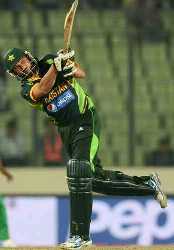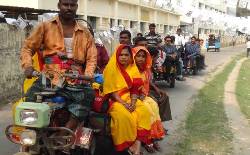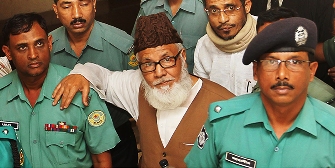When does one need ''a bit of crossfire''?
Afsan Chowdhury : I think they need it now. Everyone needs it because killing one's enemy without any trial is one of the most convenient things that law and order regimes have invented. Small things like rule of law, protection from the state and basically not getting shot by the law and order agents whenever it suits them are some of the basic notions of a modern state. But Bangladesh has been killing its enemies in crossfire and other forms of extra-judicial means right from its birth. While the names change � Rakkhi Bahini, RAB, etc � the basic purpose and intent remain the same. And the enemy is always the same too. They are called terrorists. It's therefore not an accident that AL Minister Shahjahan Khan says we need a little bit of crossfire to stamp down terrorism. What does it matter if some people think it's illegal and a violation of basic human rights?
* * *
Both terrorism and counter-terrorism variety have always been with us. It basically means when a group tries to achieve its political ends through violence and without a need to play by the rules of law. The history of ''terrorism'' actually has very respectable roots in Bengal. Those who were first called terrorists were people like Khudiram Bose, Surya Sen, Bhagat Singh, etc. who fought the British rulers. Later all those people were hanged once caught by the police. But they have remained folk heroes. During 1971, the Mukti Bahini was labelled as �miscreants' but also was referred to as terrorists by their political opponents. However, again they were and are our national heroes. The situation however changes according to the perspective of the people on both sides of the barricade.
* * *
After 1971, we had a group who were termed as ''terrorists''. They were the extreme Left who took up arms to fight the newly installed Mujib regime. It became a contest between state and anti-state forces and one by-product of this was the creation of the Rakkhi Bahini. This was the first time that people were introduced to organised counter-terrorism of the crossfire variety. Raised as a parallel force to the police and army, it was feared and became the face of extra-judicial killing and disappearances. It also became the recipient of all anti-government hatred and paid a price after the regime changeover by being abolished but no investigations into its activities were carried out. Thus it was established as a precedent.
* * *
But an equally deadly form of terrorism was birthed on August 15, 2024 when a group of retired and serving army officers killed Sheikh Mujib and his family and took over state powers. The definitions and scope of terrorism applies very much to the August coup which again was a civil military alliance activity. But this very group was seen by a section of people as having replaced an earlier group the Rakkhis creating the space in which the extra-constitutional arrangements increased. However by November 3-7, as many as three different military groups had tried the same tactics and ultimately General Ziaur Rahman came to power. While each group claims itself to be pious and patriotic, the fact remains that every usurpation of state power is extra-constitutional and when it's backed by force, it becomes by conventional terms, ''terrorist''.
* * *
The third group of terrorists is the Islamic militants who have sprouted several branches. Many factors have gone behind their birth but the one that sticks out the most is the role of Jamaat-e-Islami in 1971 when they actively pursued such activities. Subsequently, a variety of forces have emerged including the JMB and Hijbut-Tahrir apart from the JI activists following the War Crimes Trial verdicts. By all means these are terrorists but while government forces are arguing that encounter killings are needed to contain terrorism, it also by being a party to such killings risk becoming a counter-terrorist. This is when the state mimics the very forces it tries to defeat.
* * *
The latest entry into this debate is RAB which has been on since 2004 and was birthed under the then BNP rule. Since then it has become the symbol of the state in its extra-judicial role and identity. There have been so many accusations that people no longer question it. Since it has continued through both regimes, RAB has become ''legitimate'' and in an odd way the official source of extra-constitutional force in Bangladesh. So what the Minister has done was to spell out the facts as it exists. Not only is RAB extra-legal but extra legality is here to stay. It is in many ways, an accurate picture of the state.
* * *
So when does the State needs official forces that engage in encounter killings and it's taken for a fact that it will be protected as part of a new culture? In this new arrangement, the State no longer has to respect law to uphold its rule. It can act outside it and it becomes a legitimate business of the state, both administratively and socially. In fact, social support for RAB is well known. So in every way, RAB and its crossfire killings are part of the structure which makes up the state. But this also changes the fundamental nature of the state.
* * *
Which is why the violent episode that we saw when people were killed becomes the face of the terrorist and the response to the terrorists is also in the same language. If the state is not bothered by encounter killings why should the terrorist be? By becoming a part to it, the state has expanded the space for terrorism because every death in crossfire is an endorsement for another murder. In the end, nobody lives by the law and we enter a statehood which fails to define what living under law means.
The time for anger is over but when state unleashes crossfire killings, it's not its enemy it kills, but the very principles which brought the state into existence in the first place.
Afsan Chowdhury is a journalist, activist and writer.
�
Local Time : 0858 Hours, 12 March 2024
|
|









